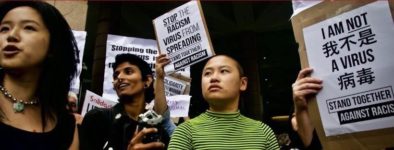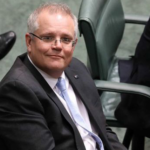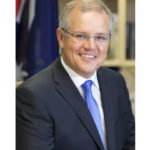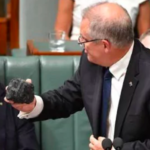Coronavirus: A Convenient Distraction From the Real Issues

Authorities in China reported on Sunday that there were 2,009 new cases of coronavirus, along with 142 deaths, which marked a drop in fresh cases for the third consecutive day in a row.
Meanwhile, in Australia, prime minister Scott Morrison has extended the travel ban on noncitizens and non-residents, who’ve recently been in mainland China for another week.
The initial two week ban was announced on 1 February, while days earlier, the PM spruiked plans to send hundreds of Australian citizens and residents returning from the virus epicentre Hubei province to the Christmas Island immigration detention facility for two weeks quarantine.
And Morrison also threw in that one million facemasks would be distributed nationwide.
But, amidst the moral panic and the media hype, the ban on mainly Chinese nationals and the offshore detention of mostly Chinese Australian citizens and non-residents, it seems these prejudicial measures have been a welcome distraction for government.
Indeed, the decision to act on COVID-19 conveniently deflected from the huge fallout over the Coalition’s dismal reaction to the bushfire crisis, and its lack of action on climate, that had been front and centre of the national debate.
A racially charged response
University of Sydney Students’ Representative Council (SRC) president Liam Donohoe agreed that that the coronavirus response has served as a “good distraction”, but he also maintains that the highly racially-motivated reaction would have been the same without the unprecedented fires.
“In the climate of broader xenophobia,” Donohoe explained, “an event like this – along with the government’s imperial rivalry with China – makes this reaction a somewhat predictable way for the Liberal Party to respond.”
The majority of the over 200 mainly Chinese Australians who’d been held at the notorious Christmas Island facility were returned to the mainland on Monday. And the SRC has labelled the decision to send them to the detention centre steeped in “stopping the boats” sentiment as xenophobic.
“It’s utterly abhorrent,” the uni student declared. “To use an institution that exists for purely racist reasons is quite unacceptable”. And he added that locking up uninfected people in a prison with potential carriers was counterintuitive and potentially psychologically scarring for the victims.
Stop the xenophobic ban
However, the Sydney University SRC’s main concern around the federal government’s COVID-19 response is the travel restriction, which it’s repeatedly emphasised is a highly racist tactic. And the council held its second anti-travel ban protest rally on Wednesday afternoon.
“There are three reasons why we think it’s racist,” Donohoe told Sydney Criminal Lawyers. The first is that it treats the vast and diverse country of China as a homogeneous entity, while the second is that applying it to only foreign nationals that aren’t residents is again prejudicial in its exclusivity.
And then there’s the third reason, which is the difference in the response to this virus originating in China, compared with how governments have reacted to viruses that have broken out elsewhere in the world.
“In 2009, there was a large outbreak of swine flu in America, which was not met with this particular response,” the SRC president said. The swine flu killed an estimated 284,500 people globally. There were over 60 million cases worldwide in its first year. And it spread to 214 countries.
Council of International Students president Ahmed Ademoglu warned last week that the travel ban is likely to hurt the nation’s international education industry. And he pointed to cases of Chinese students being detained and then deported at airports as being particularly detrimental.
Mr Donohoe made clear that while Wednesday’s protest was against the travel ban, it was more crucially about sending “a message to international students to show we care and think about them, particularly the students that have been excluded”.







